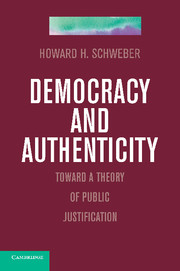Book contents
- Frontmatter
- Contents
- 1 Introduction
- Part One The Case for Constraint
- Part Two Responding to the Case for Inclusion
- 7 Arguments from Consequences
- 8 Further Arguments from Consequences
- 9 Fairness as Equality
- 10 Fairness as Recognition
- 11 The Argument from Epistemology
- 12 Empiricism and Public Justification
- 13 Toward a Theory of Public Justification
- Bibliography
- Index
- References
11 - The Argument from Epistemology
Claims of Equivalence
from Part Two - Responding to the Case for Inclusion
Published online by Cambridge University Press: 05 November 2011
- Frontmatter
- Contents
- 1 Introduction
- Part One The Case for Constraint
- Part Two Responding to the Case for Inclusion
- 7 Arguments from Consequences
- 8 Further Arguments from Consequences
- 9 Fairness as Equality
- 10 Fairness as Recognition
- 11 The Argument from Epistemology
- 12 Empiricism and Public Justification
- 13 Toward a Theory of Public Justification
- Bibliography
- Index
- References
Summary
Questions of epistemology arise in complicated ways. The case for constraint in the theory of public justification depends on the claim that there exist certain categories of arguments, of which “religious” names an important case, that ought not to be permitted in public political discourse. Inclusionist arguments often focus on claims that there are no good epistemological grounds for distinguishing among different kinds of justifications. These arguments can be divided into two sorts of claims: that there is no articulable difference at all among religious and other forms of arguments (“perfect equivalence”), and that some arguments that are characterized as religious are distinguishable from publicly accessible forms of reason, and hence are properly excluded, but that other forms of religious justifications do not fit that description (“partial equivalence”). In this chapter, I engage these forms of the epistemological argument for inclusion and in the next chapter, I attempt to move from that dialogue to a better formulation of what is meant by describing a proffered justification as “accessible.”
One thing that makes these arguments complicated is the sometimes uneasy relationship between assertions of fact and normative conclusions. Without prejudging the case, let us consider an easy (and hence not terribly interesting) hypothetical case. Imagine two arguments in favor of a law criminalizing the act of wearing wool and linen in the same garment (shatnes), an act that is forbidden in the Hebrew Bible (New Revised Standard Bible Translation Committee, 1990: Leviticus 19:19). One argument states simply, “This practice is prohibited by the Bible, and a majority of us believe that the laws of the Bible should be observed.” The gravamen of the entire argument of this book has been that without more, this would not describe a proper justification for using the power of the state to enforce the rule against shatnes among nonbelievers. But now consider a second case in which the speaker says, “This practice is prohibited by the Bible; the accounts of events contained in the Bible demonstrate that a nation's failure to follow its laws leads to God sending earthquakes, locust attacks, and foreign invaders against that nation; therefore we should prevent this practice by making it a crime.” Here, the immediate justification, which is eminently accessible, is a prediction of disastrous consequences. The difficulty is that the conclusion is based on a whole series of assumptions: the reliability of accounts of historical events in the biblical text; the reliability of the biblical assertion that these events were expressions of divine displeasure; the reliability of the assumption that God exists and continues to work in the manner described in the biblical text; and the reliability of the interpretation of the rule at issue (this last is obviously more problematic in some cases than in others).
- Type
- Chapter
- Information
- Democracy and AuthenticityToward a Theory of Public Justification, pp. 328 - 363Publisher: Cambridge University PressPrint publication year: 2011



